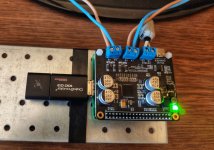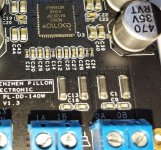No. I have a raspberry hat: RPi-3A+, 19 volt psu meanwell gst90, software YoctoAP x64. But the installed parts probably do not match the design or are fakes - electrolytic capacitors and ferrites. I want to replace them.Are your originals broken? or perhaps are you doing a design from scratch?
Attachments
Ferrite beads are as per the datasheet. Maybe not the exact model, but I havce a difficult time believing that ferrites from the same mfg with slightly different shapes but similar overall volume will be much different. The poly caps are as per the datashooet as well, just with double the amount and a higher capacitance. I haven;t seen that design before. Looks close to the reference/EVM sort of https://www.newark.com/infineon/ref...|ptaid||&CMP=KNC-GUSA-PMAX-Shopping-High-ROAS
User manual for MERUS™ MA120xxx reference boards - L0A, L0B, L1A, L1B, SMD ferrite bead, Z = 56 Ω, Fair-Rite 2512065007Y6. Size 1206. On my board, ferrites of a different size are installed. Fake?
It is the same with electrolytic capacitors, the manufacturer is unknown, there can be any marking on them. This is an ancient Chinese game. I plan to replace with Panasonic fm 330/35
It is the same with electrolytic capacitors, the manufacturer is unknown, there can be any marking on them. This is an ancient Chinese game. I plan to replace with Panasonic fm 330/35
Attachments
Replacing the ceramic 4 x 1 nF at the outputs for 100V rated film caps is an easy improvement. I would leave the beads. Use SMD electrolytic caps. The used caps are generic chinese quality. A member here once found out the brand but it is nothing special.
Which impedance capacitors are best for this design? General purpose or low-esr or very low-esr, e.g. EEHZK1V331P?Use SMD electrolytic caps.
While I just gambled it would be good to use ultra low ESR caps. It was that FC was in stock or I would have chosen ultra low ESR caps for PVDD. It surprises me that it sounds better with just 1500 uF. Probably the SMPS likes less capacitance.
Parts shortage is becoming a nuisance. In large can snap in I could only get Yageo caps produced in 2016.
Parts shortage is becoming a nuisance. In large can snap in I could only get Yageo caps produced in 2016.
Last edited:
450uf Oscon SEP sounds better on my 3116
than 3 x 680uf FC. So I guess more is not always better.
than 3 x 680uf FC. So I guess more is not always better.
The use of ultra low impedance electrolytic capacitors (hybrid polymer or os-son) requires special care, especially if shunt ceramic capacitors are used. High probability of occurrence of resonances. It is necessary to carry out measurements with an oscilloscope after installation is completed.
Solve, A8 IS a Merus device.
* again it becomes clear that ceramic caps of sub X7R quality are a bad choice for coupling. Even a 100 nF film cap in parallel improved sound quality. Not a fan of paralleled caps but there is not much other choice. The curse of MA12070 is that it needs many caps around it.
Yes I mean the Merus board typical PL-AD-160.
And to remove those input caps with 0 ohms is not recomended by me.
It broke the amp.
Two heavy bumps in speaker and protection mode.
* again it becomes clear that ceramic caps of sub X7R quality are a bad choice for coupling. Even a 100 nF film cap in parallel improved sound quality. Not a fan of paralleled caps but there is not much other choice. The curse of MA12070 is that it needs many caps around it.
Yes I mean the Merus board typical PL-AD-160.
And to remove those input caps with 0 ohms is not recomended by me.
It broke the amp.
Two heavy bumps in speaker and protection mode.
Hi,
Been patiently waiting for ma12070 to release a tiny board such as the tpa3110 shown in the picture. Just wondering if anyone is working on it?

Been patiently waiting for ma12070 to release a tiny board such as the tpa3110 shown in the picture. Just wondering if anyone is working on it?
Can you share it? 🙂)I'm also a step further with my 4ch output MA12070P DSP powered Amp project.
Just ordered the PCBs this week. Hope to get everything assembled until my christmas holidays starts to use my vacation for the DSP software
Last edited by a moderator:
Should not give any issues unless one couples it directly (user error) or shorts inputs to each other or GND. I meant to short the caps and to use better quality ones earlier in the chain. Netto result is the same (electrically). From onboard X5R to external film so to speak. With these boards there is almost no possibility to directly replace existing mediocre caps for better stuff. I shorted the caps in a few devices and used external caps without issues. Point is to use small film caps with short lead wires. I found the Wima 1 µF 50V in 2.5 mm for use as input caps for the opamps but I fear the PCB tracks will peel off this time.Yes I mean the Merus board typical PL-AD-160.
And to remove those input caps with 0 ohms is not recomended by me.
It broke the amp.
Two heavy bumps in speaker and protection mode.
The A8 has about 24 caps around it.... of which not all need to be replaced but still. Meanwhile the A8 has moved to my main system. I am satisfied with the results till now. Don't ask me the why and how as I simply just do something in this device (with thought, against principle but convenient) but it has nicer highs after the cap replacement too. I think it is musical, precise, has deep bass and good stereo imaging. In fact I want to keep it alive and refrain from risky jobs.
The issue with the chip is that doing things like we want it will cost a lot of money so modding existing boards is the practical way of dealing with it. Drawback is that "low cost" is spelled all over the boards.
Last edited:
No shorted inputs and coupled with MKS 4.7 uF short wires.Should not give any issues unless one couples it directly (user error) or shorts inputs to GND. I meant to short the caps and to use better quality ones earlier in the chain. Netto result is the same (electrically). From onboard X5R to external film so to speak. With these boards there is almost no possibility to directly replace existing mediocre caps for better stuff. I shorted the caps in a few devices and used external caps without issues. Point is to use small film caps with short lead wires.
The issue with the chip is that doing things like we want it will cost a lot of money so modding existing boards is the practical way of dealing with it. Drawback is that "low cost" is spelled all over the boards.
Proctection mode even with no inputs.
Measured all input pins? They all should have the same DC offset. Could be a very thin tin whisker (also between inputs). I have a PL-AD-160 with shorted input caps waiting to be powered on. Not today though as I will be away a few days.
IF it is pickup of unwanted signals you could short the input side of the Wima film caps to GND for testing.
IF it is pickup of unwanted signals you could short the input side of the Wima film caps to GND for testing.
I read this as "spilled all over" and laughed.. . . .
The issue with the chip is that doing things like we want it will cost a lot of money so modding existing boards is the practical way of dealing with it. Drawback is that "low cost" is spelled all over the boards.
Measured all input pins? They all should have the same DC offset. Could be a very thin tin whisker (also between inputs). I have a PL-AD-160 with shorted input caps waiting to be powered on. Not today though as I will be away a few days.
IF it is pickup of unwanted signals you could short the input side of the Wima film caps to GND for testing.
Don't forget that old, brittle solder braid is also a great supply of shorting material 😢
Oof. I was hoping I could leave the pot in on one of these amps. But when the amp has to damp hard transients above 1.7V it has a.... a weird noise. It;s like the amp with the pot is not playing right but the one with resistor bypass is perfect. Happens across multiple sources. These pots measure like junk and they just are junk. Shame on Topping, They can do a lot better. Time to make another resistor network for fixed attenuation.
Try to find a real Alps logarithmic version. This is one of the higher impact modifications in Chi-Fi amplifiers.
Without knowing I have these I found a small number of them in my stock. Makes a significant difference.
You are right about the desoldering braid leaving a thin strand of wire shorting stuff. In the past this has cost me more time than I would have liked.
Without knowing I have these I found a small number of them in my stock. Makes a significant difference.
You are right about the desoldering braid leaving a thin strand of wire shorting stuff. In the past this has cost me more time than I would have liked.
I have one of those massively overkill large clicky boys packed full of 1/4W resistors on a headamp. But for these PA3s I just want them to be straight power amps. This is easier and waaaaaaaaaaaaaay less expensive 😛

Put it in amp #2 last night so now they both match. Caps are of course from factory. Only shows up from analog sources. I'm actually working to have all my analog flow a heretical path that will annoy both digital music aficionados and analog aficionados equally.
Analog:
Source -> Preamp -> E1DA Cosmos ADC -> PC Digital USB -> [PC DSP Matrix] -> USB 9038 DAC Input
Non-PC Digital:
HDMI Source -> AVR Room Correction -> I2S LVDS out of AVR (mod) -> I2S LVDS 9038 DAC Input
Both: DAC Output XLR -> Driverack PA2 -> Topping PA3s Biamp -> Stereo Speakers
Next project is to find a remote where I can program macros so that switching to an input. of say Fire TV Cube, will pop the AVR to that HDMI and the DAC to LVDS input.
Put it in amp #2 last night so now they both match. Caps are of course from factory. Only shows up from analog sources. I'm actually working to have all my analog flow a heretical path that will annoy both digital music aficionados and analog aficionados equally.
Analog:
Source -> Preamp -> E1DA Cosmos ADC -> PC Digital USB -> [PC DSP Matrix] -> USB 9038 DAC Input
Non-PC Digital:
HDMI Source -> AVR Room Correction -> I2S LVDS out of AVR (mod) -> I2S LVDS 9038 DAC Input
Both: DAC Output XLR -> Driverack PA2 -> Topping PA3s Biamp -> Stereo Speakers
Next project is to find a remote where I can program macros so that switching to an input. of say Fire TV Cube, will pop the AVR to that HDMI and the DAC to LVDS input.
- Home
- Amplifiers
- Class D
- Infineon MA12070 Class D


